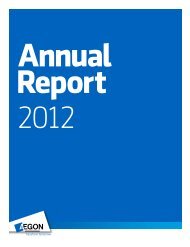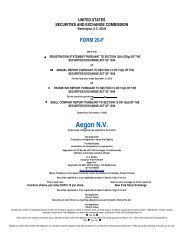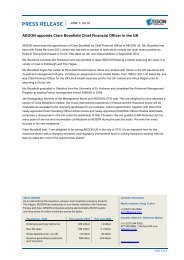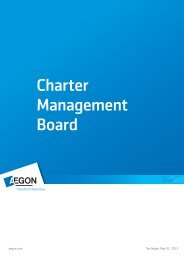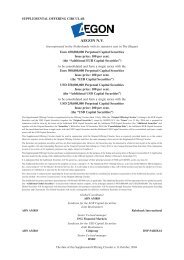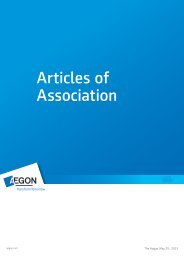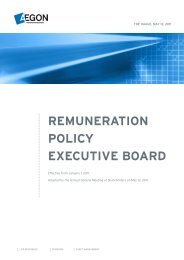Prospectus supplement US007924AH66 - Aegon
Prospectus supplement US007924AH66 - Aegon
Prospectus supplement US007924AH66 - Aegon
Create successful ePaper yourself
Turn your PDF publications into a flip-book with our unique Google optimized e-Paper software.
ERISA CONSIDERATIONS<br />
A fiduciary of a pension, profit-sharing or other employee benefit plan subject to the U.S.<br />
Employee Retirement Income Security Act of 1974, as amended (‘‘ERISA’’), should consider the<br />
fiduciary standards of ERISA in the context of the plan’s particular circumstances before authorizing an<br />
investment in securities offered hereby. Among other factors, the fiduciary should consider whether the<br />
investment would satisfy the prudence and diversification requirements of ERISA and would be<br />
consistent with the documents and instruments governing the plan.<br />
Section 406 of ERISA and Section 4975 of the U.S. Internal Revenue Code of 1986, as amended<br />
(the ‘‘Code’’) prohibit an employee benefit plan, as well as individual retirement accounts and Keogh<br />
plans subject to Section 4975 of the Code, from engaging in certain transactions involving ‘‘plan assets’’<br />
with persons who are ‘‘parties in interest’’ under ERISA or ‘‘disqualified persons’’ under the Code with<br />
respect to the plan. A violation of these ‘‘prohibited transaction’’ rules may result in excise tax or other<br />
liabilities under ERISA and Section 4975 of the Code for such persons, unless exemptive relief is<br />
available under an applicable statutory or administrative exemption. Therefore, a fiduciary of an<br />
employee benefit plan should also consider whether an investment in securities offered hereby might<br />
constitute or give rise to a prohibited transaction under ERISA and the Code. Employee benefit plans<br />
which are governmental plans (as defined in Section 3(32) of ERISA), certain church plans (as defined<br />
in Section 3(33) of ERISA), and non-U.S. plans (as described in Section 4(b)(4) of ERISA) generally<br />
are not subject to the requirements of ERISA or Section 4975 of the Code, but may be subject to other<br />
federal, state, local or non-U.S. laws that are substantially similar to the provisions of Section 406 of<br />
ERISA or Section 4975 of the Code (‘‘Similar Laws’’).<br />
We and certain of our subsidiaries may be a party in interest or disqualified person with respect to<br />
an employee benefit plan if, for example, we or a subsidiary provides services to the plan. Special<br />
caution should be exercised in that event, before securities offered hereby are purchased by the plan. In<br />
particular, the fiduciary of the plan should consider whether exemptive relief from the prohibited<br />
transaction provisions of ERISA and the Code is available under an applicable regulatory or<br />
administrative exemption. Section 408(b)(17) of ERISA and Section 4975(d)(20) of the Code provide<br />
an exemption for the purchase and sale of securities where neither Allianz nor any of its affiliates have<br />
or exercise any discretionary authority or control or render any investment advice with respect to the<br />
assets of the plan involved in the transaction and the plan pays no more and receives no less than<br />
‘‘adequate consideration’’ in connection with the transaction (the ‘‘service provider exemption’’). In<br />
addition, the U.S. Department of Labor has issued five prohibited transaction class exemptions that<br />
could apply to exempt the purchase, sale and holding of securities offered hereby from the prohibited<br />
transaction provisions of ERISA and the Code. Those class exemptions are Prohibited Transaction<br />
Exemption 96-23 (for certain transactions determined by in-house asset managers), Prohibited<br />
Transaction Exemption 95-60 (for certain transactions involving insurance company general accounts),<br />
Prohibited Transaction Exemption 91-38 (for certain transactions involving bank collective investment<br />
funds), Prohibited Transaction Exemption 90-1 (for certain transactions involving insurance company<br />
separate accounts), and Prohibited Transaction Exemption 84-14 (for certain transactions determined by<br />
independent qualified asset managers).<br />
Because of the complexity of these rules and the penalties that may be imposed upon persons<br />
involved in non-exempt prohibited transactions, it is particularly important that fiduciaries or other<br />
persons considering the purchase of any securities offered hereby on behalf of or with ‘‘plan assets’’ of<br />
any employee benefit plan consult with their counsel regarding the consequences under ERISA and the<br />
Code of the acquisition of such securities and the availability of exemptive relief under the service<br />
provider exemption, Prohibited Transaction Exemption 96-23, 95-60, 91-38, 90-1 or 84-14 or similar<br />
exemptions from Similar Laws. Purchasers of securities offered hereby have exclusive responsibility for<br />
ensuring that their purchase and holding of the securities do not violate the fiduciary or prohibited<br />
transaction rules of ERISA or the Code. The sale of any securities offered hereby to a plan subject to<br />
ERISA or the Code or any Similar Laws is in no respect a representation by us or any of our affiliates<br />
or representatives that such an investment meets all relevant legal requirements with respect to<br />
investments by any such plan generally or any particular plan, or that such investment is appropriate<br />
for such plans generally or any particular plan.<br />
46



